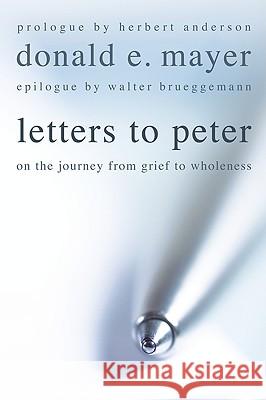Letters to Peter: On the Journey from Grief to Wholeness » książka
Letters to Peter: On the Journey from Grief to Wholeness
ISBN-13: 9781608991044 / Angielski / Miękka / 2010 / 196 str.
Letters to Peter: On the Journey from Grief to Wholeness
ISBN-13: 9781608991044 / Angielski / Miękka / 2010 / 196 str.
(netto: 86,16 VAT: 5%)
Najniższa cena z 30 dni: 89,96
ok. 16-18 dni roboczych.
Darmowa dostawa!
Description: ""Dad. I've got very, very, very bad news. Peter was killed tonight . . ."" With that middle-of-the-night phone call, life for the Mayer family plunged from ""best-ever year"" to months and years of dealing with the oppressive presence of Peter's unending absence. A letter from his father to the freshly deceased Peter, intended for the memorial service, became the first in a torrent of letters from his dad to Peter, though which his dad poured out agonized and angry grief. In the letters, Peter's dad laments the way events otherwise beautiful for Peter's wife, five-year-old daughter, and the rest of the family are relentlessly punctuated with the pain of the loss. ""Dammit, Peter, why didn't you . . .?"" Ultimately, slowly, the letters begin to reflect on the strange mystery of healing. How is it that in spite of the pain, in spite of the unending loss, comfort does come, opening the way once again for unbelievably deep joy? ""It was all so rich and beautiful that with a certain private touch, and exchange of glance, your mom and I signaled an agreement . . . slipped to our cave . . . with playful freedom and deep gratitude."" So for Peter's dad, the confirmation of the odd observation from Jesus: ""How blessed are those who grieve "" Endorsements: ""So how does a minister address the sudden, potentially faith-shattering loss of his adult son, Peter? I wondered . . . In each letter, I heard the soulful humanness of grief calling out. Letters to Peter affirmed and expanded my understanding of the mysterious and expansive nature of faith and of God. The religious and theological underpinnings became universal and philosophical in probing for meaning. What an extraordinary relationship evolves through these letters . . . Father and son become one."" --Molly Greist stone sculptor, bereaved parent ""These poignant letters testify to the great affection between a father and son. Mayer's plaintive cry of ""how could you?"" points up the apparent senselessness of the sudden death of a young person. His lamentation echoes some of the great biblical sorrows down through the centuries. The letters will be of particular help to all those suffering grief and loss, no matter what the circumstances."" --Patrick Howell SJ Rector, Jesuit Community, Seattle University Former dean of the School of Theology and Ministry About the Contributor(s): Donald E. Mayer is a retired minister of the United Church of Christ, advisory board chair, and adjunct faculty for the School of Theology and Ministry, Seattle University.
Description:""Dad. Ive got very, very, very bad news. Peter was killed tonight . . .""With that middle-of-the-night phone call, life for the Mayer family plunged from ""best-ever year"" to months and years of dealing with the oppressive presence of Peters unending absence.A letter from his father to the freshly deceased Peter, intended for the memorial service, became the first in a torrent of letters from his dad to Peter, though which his dad poured out agonized and angry grief. In the letters, Peters dad laments the way events otherwise beautiful for Peters wife, five-year-old daughter, and the rest of the family are relentlessly punctuated with the pain of the loss. ""Dammit, Peter, why didnt you . . .?""Ultimately, slowly, the letters begin to reflect on the strange mystery of healing. How is it that in spite of the pain, in spite of the unending loss, comfort does come, opening the way once again for unbelievably deep joy? ""It was all so rich and beautiful that with a certain private touch, and exchange of glance, your mom and I signaled an agreement . . . slipped to our cave . . . with playful freedom and deep gratitude."" So for Peters dad, the confirmation of the odd observation from Jesus: ""How blessed are those who grieve!""Endorsements:""So how does a minister address the sudden, potentially faith-shattering loss of his adult son, Peter? I wondered . . . In each letter, I heard the soulful humanness of grief calling out. Letters to Peter affirmed and expanded my understanding of the mysterious and expansive nature of faith and of God. The religious and theological underpinnings became universal and philosophical in probing for meaning. What an extraordinary relationship evolves through these letters . . . Father and son become one.""--Molly Greiststone sculptor, bereaved parent""These poignant letters testify to the great affection between a father and son. Mayers plaintive cry of ""how could you?"" points up the apparent senselessness of the sudden death of a young person. His lamentation echoes some of the great biblical sorrows down through the centuries. The letters will be of particular help to all those suffering grief and loss, no matter what the circumstances.""--Patrick Howell SJRector, Jesuit Community, Seattle UniversityFormer dean of the School of Theology and MinistryAbout the Contributor(s):Donald E. Mayer is a retired minister of the United Church of Christ, advisory board chair, and adjunct faculty for the School of Theology and Ministry, Seattle University.











